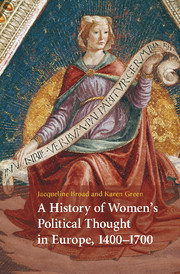Book contents
- Frontmatter
- Contents
- Preface
- Introduction
- 1 Christine de Pizan
- 2 Women of the Italian Renaissance
- 3 From Anne de Beaujeu to Marguerite de Navarre
- 4 Queen Elizabeth I of England
- 5 From the Reformation to Marie le Jars de Gournay
- 6 Women of the English civil war era
- 7 Quaker women
- 8 The Fronde and Madeleine de Scudéry
- 9 Margaret Cavendish, Duchess of Newcastle
- 10 Women of the Glorious Revolution
- 11 Women of late seventeenth-century France
- 12 Mary Astell
- Conclusion
- Bibliography
- Index
Introduction
Published online by Cambridge University Press: 02 July 2009
- Frontmatter
- Contents
- Preface
- Introduction
- 1 Christine de Pizan
- 2 Women of the Italian Renaissance
- 3 From Anne de Beaujeu to Marguerite de Navarre
- 4 Queen Elizabeth I of England
- 5 From the Reformation to Marie le Jars de Gournay
- 6 Women of the English civil war era
- 7 Quaker women
- 8 The Fronde and Madeleine de Scudéry
- 9 Margaret Cavendish, Duchess of Newcastle
- 10 Women of the Glorious Revolution
- 11 Women of late seventeenth-century France
- 12 Mary Astell
- Conclusion
- Bibliography
- Index
Summary
In Some Reflections Upon Marriage (1700), Mary Astell (1666–1731) wryly observes that it is ‘Men who dispute for Truth as well as Men who argue against it; Histories are writ by them, they recount each others great Exploits, and have always done so.’ It might have pleased Astell to learn that, more than three hundred years later, many women would also be historians, and that women's exploits now rate a mention in the standard history books. More recently, women's intellectual history has also begun to receive scholarly attention. In the case of the history of political thought, there have been several articles about women's political ideas, and a few monographs devoted to individual figures, as well as collections of essays on female political thinkers in particular historical periods and locations. Recent developments in this area are partly due to the fact that women's political texts are now more publicly available than ever before. But Astell's observation still holds true in one respect: even though the best-known histories of political thought are no longer written solely by men, they still tend to be about men – especially well-known men, such as Plato, Aristotle, Dante, Machiavelli, Hobbes, Locke, and Rousseau. In this book, we aim to redress the imbalance by providing a history of women's political thought in Europe from the late medieval to the early modern period.
- Type
- Chapter
- Information
- Publisher: Cambridge University PressPrint publication year: 2009

